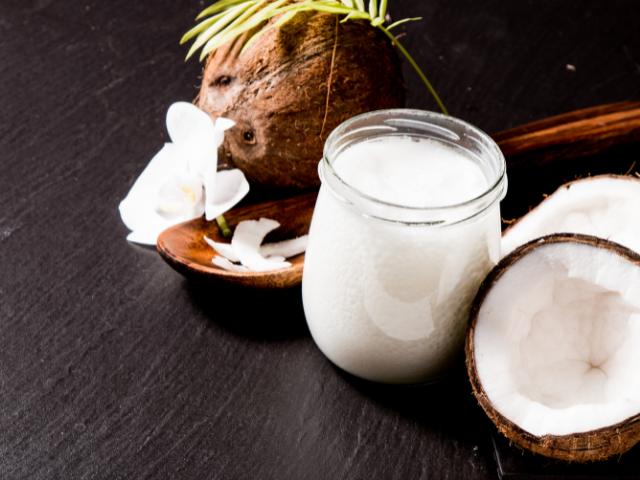Can dogs eat coconut oil? The answer is Yes! Let’s explain why! Coconut oil is known as a common ingredient frequently used in pet care products. But, can dogs eat coconut oil? Is coconut oil safe for them?
In fact, coconut oil is considered a supplement that has been growing in popularity during recent years. Credible data and well-researched analysis concluded that there are many purported benefits, which dogs can get when taking coconut oil at defined dosage levels.
It is also recognized that coconut oil comes from mature fruits. So, it is appropriate for being used in both dog food and dog health products. More definitely, coconut oil is a medium-chain triglyceride, a saturated fatty acid.
In general, medium-chain triglycerides are easier to digest than long-chain triglycerides. So, they are better energy sources than long-chain triglycerides, and they are less likely to be converted into fat deposits.

Coconut Oil Is An Antibacterial
Medium-chain triglycerides include caprylic acid, capric acid, regarded as antifungal, and lauric acid that has been described as antifungal as well as antibacterial. Coconut oil can also contain myristic, palmitic, and linoleic acids. So, it is full of potential health benefits that can enrich your dog’s life.
Based on the coconut oil’s medicinal properties, and according to different laboratory experiments, it became apparent that coconut oil is suitable for your dog’s daily diet and helpful in healing wounds, mainly if they are superficial.
Can Dogs Eat Coconut Oil And Take Advantage Of It?
Numerous studies, still being reviewed, showed that coconut oil has positive effects on the pet body. These veterinarians who conducted these studies have already appreciated the fantastic properties of dog products mainly made from coconut trees.
Wildlife biologists also emphasized that regular consumption of coconut oil has tangible impacts on:
- The dog’s immune system.
- Metabolism mechanism.
- The dog’s skin and fur.
- Bone strength.
- Brain functions.
- Physical activity.
- The liver and pancreas, as coconut oil removes toxins and eliminates impurities.
Additional Benefits For Your Dog’s Body
Still not satisfied with the answer to the question, can dogs eat coconut oil and benefit from it? Here, we will discuss more benefits of this oil!
Coconut oil improves food absorption and helps in treating all digestive disorders, such as colitis, constipation, and irritable bowel syndrome. It prevents infections and alleviates chronic diseases if your dog suffers from any of them.
The oil also helps your dog’s body regulate and balance insulin levels, as it is an excellent source of omega-6 fatty acids, which improve communication between brain cells, which, in turn, maintain proper body functions.
In addition, the systematized usage of coconut oil will make your dog feel full for a longer time. Since many pets are overweight, using coconut oil in their daily diet can be of great benefit.

Coconut Oil Reduces Inflammation
New studies have shown that a regular daily intake of coconut oil can help relieve arthritis symptoms and ligament pain. Arthritis diseases are actually related to bacterial infections that can penetrate your dog muscles and joints. The bacteria can invade the joint tissue, leading to arthritis, even after the bacterial infection itself has been treated.
The same studies have indicated that coconut oil prevents parasitic infections, including giardiasis. As the oil contains medium-chain fatty acids, it has an effective role in killing giardia lamblia and other types of protozoa. Using coconut oil in your dog’s daily diet will help eliminate any parasite before it latches onto your dog’s body.
Coconut Oil Moisturizes The Skin
If you notice that your dog’s paw pads are cracked and dry, just apply a little coconut oil before your dog goes to its bed. Using a small amount of coconut oil can easily prevent mats, which are responsible for long-haired breeds.
Coconut oil is also used to clean your dog’s ears; it has curative characteristics that maintain hearing efficiency. Being a pure and natural extract, coconut oil is considered one of the best bacterial agents, which can help alleviate your dog’s eye symptoms.
Just rub a small amount of coconut into your dog’s eyes if they are suffering from exhaustion; however, we recommend you visit a veterinarian before doing so.
Topical applications are helpful too. You can directly apply shampoos with organic coconut oil to your dog’s skin. It is appropriate to wait for 20 minutes until your dog’s skin absorbs the active substance that shampoo contains. Then, you can wash your puppy well.
What Is The Recommended Amount Of Coconut Oil?
Veterinarians confirmed that 1/4 teaspoon of coconut oil is an adequate quantity for your dog’s daily diet. After two consecutive weeks, you can gradually increase the dosage to become a full teaspoon of coconut oil. It is preferable to add it to the usual food you regularly offer to your dog every day.
It would be best if you realized that any sharp transition in the daily rate of coconut oil could cause bad symptoms similar to stomach flu. When you notice that your dog reacted negatively to the additional amount you have recently added to its diet, you should reduce the amount and provide the kind of foods your dog used to eat.
If you want to give your dog coconut oil orally, you should first ask the veterinarian, as he is the person who can determine the suitable dosage and the specific amount for each meal. He will also inform you about the best ways to offer the oil and the favorite food to which you can add the oil without any problem whatsoever.

Can Dogs Eat Coconut Oil? Final Thoughts
Let me also caution against accidentally giving too much oil to your dog in one go and suddenly ending up without any warning. It is a fact that coconut oil has many benefits if taken orally, but many potential risks may threaten your dog’s life, particularly if your dog suffers from pancreatitis.
In parallel, if your dog has a tendency to gain weight or has any other medical condition such as a metabolic disorder, coconut oil may cause serious troubles related to fat metabolism.
In conclusion, whether you want to try coconut oil topically or orally, you ought to ask the veterinarian to know the optimal intake and the ideal application methods exactly. It is advisable to offer your dog totally unrefined oil rather than a refined one. Cold-pressed coconut oil is even better, as it is processed without exposure to extreme heat. It suits your dog’s stomach and eliminates intestinal contractions.


